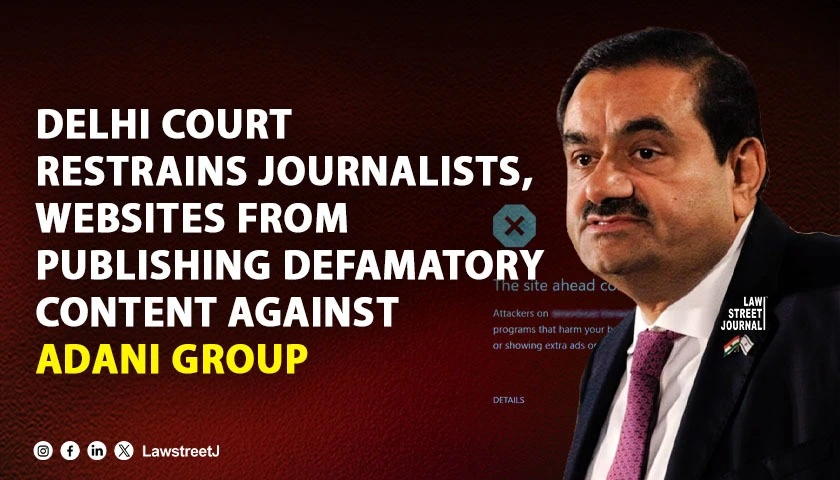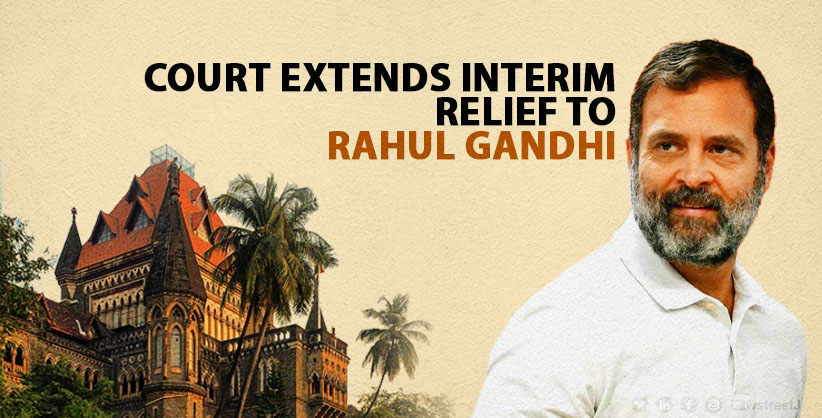New Delhi: A Delhi Court has granted interim relief to Adani Enterprises Ltd., restraining several journalists and websites from publishing unverified, prima facie defamatory reports about the Adani Group, while emphasizing the balance between freedom of speech and protection of reputation.
Senior Civil Judge Anuj Kumar Singh delivered the order on September 6, 2025, in the case CS SCJ 1066/2025, Adani Enterprises Ltd. vs. Paranjoy Guha Thakurta & Others.
The court addressed an application under Order 39 Rules 1 and 2 of the Code of Civil Procedure filed by Adani Enterprises Ltd., seeking ex-parte temporary injunctions against various defendants including journalists, website operators, and John Doe defendants.
The plaintiff alleged that certain reporters, activists, and organizations have maliciously damaged the Adani Group’s reputation, causing stakeholders billions of dollars in losses and massive damage to India’s brand credibility. The court observed, “It is stated that the defendants, by aligning with anti-India interests and continuously targeting the plaintiff’s infrastructure and energy projects, which are critical to India’s infrastructure and energy security, have disrupted these projects with ulterior motives.”
Three specific websites were identified as problematic: https://pranjoydotin, www.adaniwatchdotorg, and https://adanifilesdotcomdotau, which allegedly publish baseless and defamatory content against the Adani Group and its founder Gautam Adani.
The defendants include various journalists and contributors who have published articles on these platforms, with allegations ranging from illegal nexus claims to accusations of crony capitalism. The court noted that these websites “exist solely for the purpose of defaming the petitioner and exist only as part of a nefarious design.”
The court further emphasized the balance between freedom of speech and protection of reputation, citing the Supreme Court judgment in Subramanian Swamy v. Union of India, which established that “reputation of one cannot be allowed to be crucified at the altar of the other’s right of free speech and that the balance between the two rights needs to be struck.”
The court found that a prima facie case existed in favor of the plaintiff, noting, “As per the pleading, the plaintiff has never been found guilty by any regulatory authority or by a court of law” and that the company “came out clean” from regulatory and media scrutiny in 2023.
Recognizing the potential for irreparable harm, it observed, “It is also apparent that if the reliefs sought by the plaintiff are denied to him, he shall suffer further loss of reputation which will be incalculable and may result in irreparable injury.”
However, the court issued a balanced order rather than a blanket restraint. The court directed, “Instead of issuing a blanket order on restraining defendants no. 1 to 9 from fair, verified and substantiated reporting, it would suffice the interest of justice to restrain defendants no. 1 to 10 from publishing/distributing/circulating unverified, unsubstantiated and ex-facie defamatory reports about the plaintiff.”
The court ordered defendants to expunge prima facie defamatory material from their articles, social media posts, and tweets within five days, while directing intermediaries to remove such content within 36 hours under the Information Technology (Intermediary Guidelines and Digital Media Ethics Code) Rules, 2021.
Importantly, the court clarified that the order “shall not be construed to restrain any person from reporting about investigation and court proceedings in relation to the allegations so long as it is fair and accurate reporting based on substantiated and verified material.”
The court has scheduled the next hearing for October 9, 2025, for settlement of issues, while directing preservation of removed content for 180 days to maintain evidence integrity.
Case Title: Adani Enterprises Ltd. vs. Paranjoy Guha Thakurta & Others



![Gujarat High Court Dismisses Rahul Gandhi's Plea to Suspend Conviction in Modi Surname Defamation Case [Read Judgment]](/secure/uploads/2023/07/lj_6107_2da9b8d7-b0ad-4f07-9fff-a2ceea4c46cd.jpg)
![Delhi Court Rejects Stay Request in Defamation Case Against Rajasthan CM Ashok Gehlot [Read Order]](/secure/uploads/2023/08/lj_5208_80de1ddc-d76a-4f7f-b180-408e3ae14fb4.jpg)

![Bengaluru Court Orders Twitter (X Corp) to Block 'Liver Doctor' Account Amidst Defamation Lawsuit by Himalaya Wellness Company [Read Order]](/secure/uploads/2023/09/lj_8798_ffedf2a6-87bc-4d90-a3b4-077c76b2dd87.jpg)






